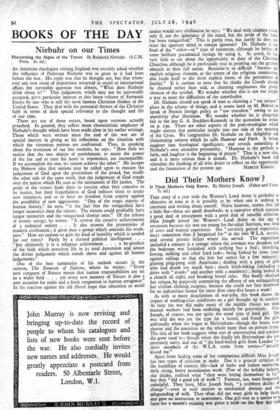BOOKS OF THE DAY
Niebuhr on our Times
AN American theologian visiting England was recently asked whether the influence of Professor Niebuhr was as great as it had been before the war. His reply was that he thought not, but that when- ever any new event of importance occurred in social or international affairs the inevitable question was always, " What does Niebuhr think about it? " That judgement, which may not be universally accepted, gives particular interest to this latest volume of Sermonic Essays by one who is still the most famous Christian thinker of the United States. They deal with the perennial themes of the Christian faith in terms of their special relevance to the thought and life of our time.
There are ten of these essays, based upon sermons actually preached. In general, they reflect those characteristic emphases of Niebuhr's thought which have been made clear in his earlier writings. Those which were written since the end of the war are of special interest in giving us his reflections on the situation with which the victorious nations are confronted. Thus, in speaking about the treatment of our late enemies, he says : " How little we realise that the two objects of punishment, to maim the power of the foe and to turn his heart to repentance, are incompatible. If we accomplish the one, we cannot achieve the other." He accepts the Hebrew idea that nations may be called upon to execute the judgement of God upon the pretensions of the proud, but recalls the other side of the same truth, that the judgement of God stands over the nation which He uses as the instrument of His justice. The pride of the victors leads them to execute what they conceive to be justice, but their forgetfulness of God induces them to create new injustices, and so to have no freedom from anxiety against the possibility of new aggressions. " One of the tragic aspects of human history," he says, "is the .fact that the vanquished have longer memories than the victors. The victors could profitably have longer memories and the vanquished shorter ones." Of the release of atomic energy, he writes : " It crowns the creative achievements of a technical society . . . It also crowns the pretensions of modern civilisation ; it gives man a power which conceals his weak- ness." How are nations to gain the kind of humility which is needed for our times? Partly by a shrewd- political intelligence . . . a but ultimately it is a religious achievement . . . a by-product of the faith which perceives life in its total dimension and senses the divine judgement which stands above and against all human judgements."
One of the best summaries of his outlook occurs in the sermon, The Nemesis of Nations, where he writes: "Every new conquest of Nature means that human responsibilities are set in a wider field . . . yet every new mastery of Nature is also a new occasion for pride and a fresh temptation to human arrogance." In his reaction against the old liberal hope that education or social
justice would save civilisation he says : " We deal with ultimate issues only if, not the ignorance of the mind, but the pride of the heart has been vanquished." This is partly true, but surely he does not want the ignorant mind to remain ignorant? Dr. Niebuhr is too fond of the " either—or " type of statement, although he brings off some brilliant paradoxical sayings by using it. As usual, he has very little to say about the opportunity or duty of the Christian Churches, although he is profoundly true in pointing out the greatest obstacle to their full union. Reunion/is so difficult "because the explicit religious element, at the centre of the religious community, also lends itself to the most explicit forms of the pretensions of finality." It is curious to note that he thinks the Creeds should be chanted rather than said, as chanting emphasises the poetic element of the symbol. We wonder whether this is not too simple a way to meet the difficulties of the unorthodox.
Dr. Niebuhr should not speak of man as claiming a " too unique" place in the scheme of things, and it seems hard on M. Bidault to speak of French foreign policy as " too truculent " owing to her sensitivity after liberation. We wonder whether he_ is altogether fair to the late G. A. Studdert-Kennedy in the quotation he makes on p. 13o. There are other aspects of the poet-theologian whidi might correct that particular insight into one side of the meaning of the Cross. We congratulate Dr. Niebuhr on the delightful and illuminating sermon which he calls Humour and Faith. It brings laughter into theological significance, and reveals something of Niebuhr's own attractive personality. " Humour is the prelude to faith, and, laughter is the beginning of prayer." That is a new idea, and it is more serious than it sounds. Dr. Niebuhr's book will stimulate the thinking of all who desire to reflect on the opportunity and the frustration of the present age. MARCUS KNIGHT.






























 Previous page
Previous page